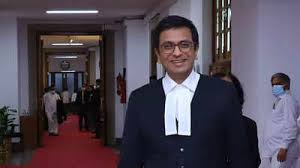


Chief Justice of India (CJI) DY Chandrachud on Saturday flagged concern that the principle of "bail is the rule, and jail is the exception" has been losing ground in district courts across India.The CJI proceeded to call for an examination of why district courts seemed to be reluctant in upholding the personal liberty of citizens. Referring to the practice of district judges appearing hesitant to grant bail, the CJI said:"There is a rising apprehension that there is restrain in district courts in matters concerning personal liberty. Bail is the rule is losing ground in district courts and this trend needs thorough evaluation and all district judges must tell me why this trend is emerging."The CJI was speaking at the Judicial Officers Conclave at Kachchh, Gujarat. Supreme Court judge Justice Sanjiv Khanna also spoke at the event.The CJI in his speech dwelt at length on issues faced by the district judiciary in India.District judiciary has to continuously evolve so that faith of citizens is maintained. One of the key concerns is to develop the infrastructure of the district judiciary like have proper courtrooms and many courts suffers overcrowding of courts and delay in case filings," CJI Chandrachud said.On adjournments and case pendency, he stated that the common man feels that such a culture is a part of the judicial process."My experience is that it is easy to decide a complex case with a judgment than to persuade a lawyer to argue a case. Adjournments have become normalised now. Imagine anyone of us going to a doctor and doctor saying he is not going to treat today. Often legal decisions do not emerge during the lifetime of farmers. We should not wait for our citizens to die waiting for a judicial result. The concept of access to justice has to go beyond access to courts and has to translate into decisions of the court," he added.The CJI also expressed anguish about the lack offacilities available for women in the legal profession."Only 6 percent district courts have women friendly sanitary vending machines. I have been told women civil judges often use washroom at 9 AM and next at 6 PM. They cannot use the washrooms since they have to pass by undertrials. Same issue with child care centres. We are putting separate burden on the women. Child bearing and child rearing are significant life decisions and this creates an inclusive work place. Gender is not a woman's thing only and it is also a man's thing," he observed.The CJI also reiterated concerns over references to outdated gender stereotypes in court judgments."Often judgments coming from district court uses gender stereotypes and our district courts must use caution in this and judgments like this perpetuate biases and marginalise women within the legal system. Outdated designation of jamadars, etc. show the dated colonial structure," he said.
He further called for a change in culture in terms of interactions between the higher judiciary and the district judiciary.
"Let us stop addressing district judiciary as subordinate judiciary and infuse dignity in the work done ... Justice Bela Trivedi is an example who rose from the district judiciary and she is here to guide you all. At the Supreme court, we create policies but it is you all who implement it," he remarked as he concluded his address.
Justice Khanna, meanwhile, observed that judges have been entrusted by the people to remedy wrongs in society.
"Are judges special? No we are not. It is in the nature of work we do, it is the right conferred by the society to remedy the wrong, punish the guilty, check the injustice meted out to commoners and the poor. We must not forget the power we have is bestowed by the people and this why we have to meet the expectations of the public. And must work truthfully," he said.
TAGS: Chief Justice of India CJI DY Chandrachud bail rule jail exception district courts personal liberty concern evaluation